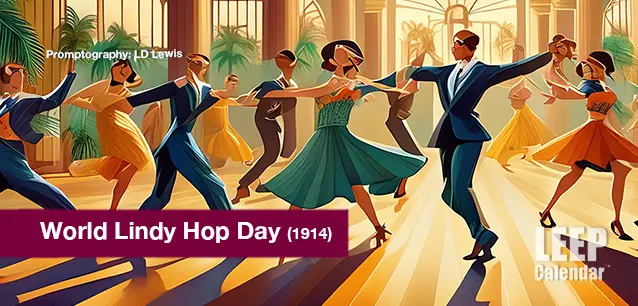 AD
AD
Today is: January 29
Scroll to explore events active on this date.
LEEP INK FEATURES

Part II
There are several unique focuses for 2025. I covered the first 12 in Part One. The following are the rest I have discovered for this year. As with all issues of LEEP Ink, the following descriptions are a...

January—It is a New Year!
We've arrived at another new year; the older I get, the more frequently they come. When I was younger, years seemed to take a long time to pass. Now, they're just a blip—here and gone. For ma...

2025 is the Year of...
21 Themes and 'Year of' Events for 2025 PART ONE, THE FIRST 12 Every year, various organizations announce the theme for the year. These themes can focus on causes, such as aesthetics and color tre...
About Lindy Hop or Jitterbug Day
Sports & Fitness , Music
Hobby , Civil Rights
Ends: May 26, 2024
DESCRIPTION:
ABOUT WORLD LINDY HOP DAY
World Lindy Hop Day occurs annually on the birthday of Frankie Manning.
Frankie Manning was a pivotal figure in developing and popularizing the Lindy Hop. Born May 26, 1914, in Jacksonville, Florida, and raised in Harlem, New York, Manning started dancing at a young age and quickly became a regular at the Savoy Ballroom, the epicenter of the Lindy Hop during the Harlem Renaissance. The Savoy Ballroom was a unique cultural venue because it was one of the first racially integrated public places in the United States. Dancers of different races could share the floor, which was uncommon in many parts of the country then. The Savoy featured nightly battles between top bands and drew the best dancers in New York, helping to cultivate the dance's development and spread in popularity.
Manning is credited with many innovations in the dance, most notably the creation of aerial maneuvers or "air steps" that became a hallmark of the Lindy Hop. One of his most famous contributions was the "over-the-back" aerial, which he reportedly first choreographed in 1935 for a performance at the Apollo Theater. This move helped his team win a crucial dance contest and set a new standard for what Lindy Hop could look like, introducing a level of acrobatics and showmanship new to popular dance. Manning and others toured with jazz greats like Duke Ellington and Count Basie, performing in dance sequences integral to the Swing era.
By the mid-20th century, the Lindy Hop had evolved into other swing dance styles in different regions.
Beyond his physical contributions to the dance, Manning also shaped Lindy Hop's cultural impact. He worked as a choreographer and dancer with Whitey's Lindy Hoppers, a professional dance troupe formed at the Savoy that performed on stage and screen, helping to spread the popularity of the dance internationally during the 1930s and 1940s.
Manning and his colleagues showcased the Lindy Hop to a global audience through films, performances, and tours, embedding it within the broader context of Swing music and dance culture.POST SWING
After a period away from the limelight following World War II and the decline of the big band era, Manning and the Lindy Hop experienced a revival in the 1980s and 1990s. He became a beloved teacher and ambassador for the dance, traveling the world to teach workshops, judge dance competitions, and share his passion and knowledge with a new generation of dancers. His teaching emphasized the joy, social interaction, and musicality of the Lindy Hop, influencing countless dancers and ensuring the dance's preservation and continuation.WHY LINDY HOP?
The name Lindy Hop is commonly attributed to George "Shorty" Snowden. During a 1928 dance marathon in New York City, legend says reporters asked Snowden to name his unique style of dance. He reportedly called it "Lindy Hop" in honor of Charles Lindbergh's recent transatlantic flight, famously nicknamed "Lindy's Hop" across the Atlantic. This spontaneous moment helped propel the Lindy Hop into the spotlight.
Today, Lindy Hop is popular worldwide. It is celebrated for its rich history and role in advancing social integration through dance. It continues to be a symbol of cultural expression and creativity, taught in dance studios and performed in competitions and social gatherings around the globe.
VIDEOS
SUPPORTING DOCUMENTS
Currently, this event does not have supporting documents.
ADDITIONAL IMAGES
Currently, this event does not have supporting images.
Where would you like to go now?
 AD
AD


/footer-logo.svg)
